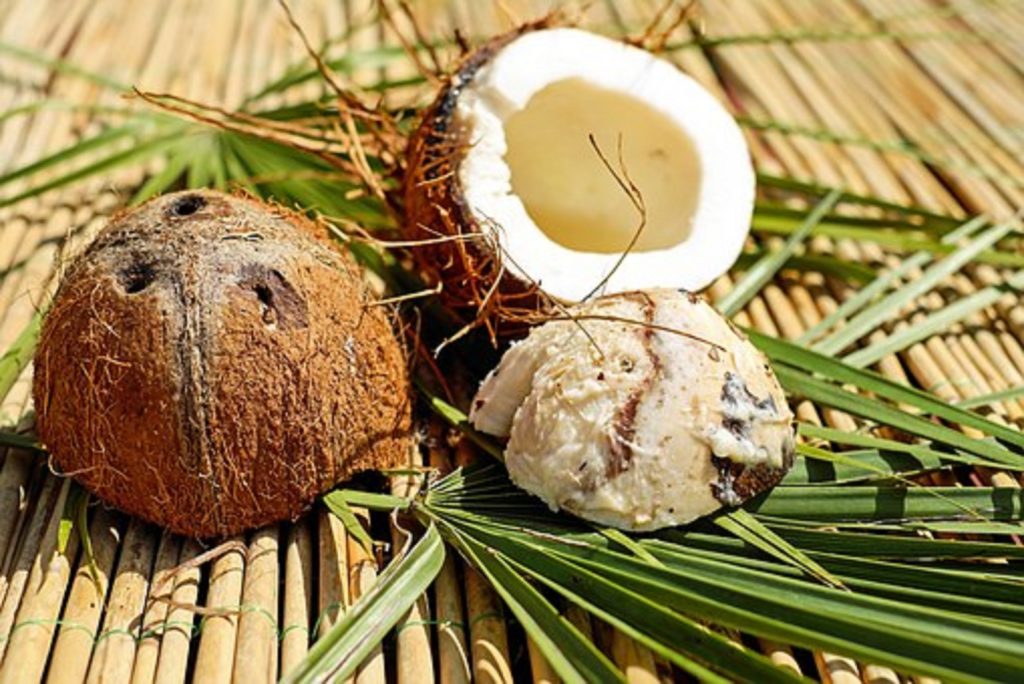Recently, coconut water received a lot of attention as being a healthy, natural alternative to sports drinks and became popular for rehydration after exercise. However, when coconut water is consumed in excess it may cause severe hyperkalemia – too much potassium in your blood. An article by the American Heart Association, titled “Death by Coconut,” reported this case♦:
A 42-year-old black man without any medical history presented to the hospital after a syncopal episode. He was playing tennis outdoors all day in temperatures in excess of 90° Fahrenheit. He reported drank a total of eight 11-ounce bottles of coconut water throughout the day. He experienced the sudden onset of lightheadedness and was witnessed to have lost consciousness. He did not experience any significant head trauma and regained consciousness almost immediately. Afterwards, he complained of generalized weakness and lightheadedness. He had high levels of potassium in his blood (hyperkalemia), he was disoriented and had a very low blood pressure and heart rate.
Coconut has always played an integral role in the culture of the Caribbean lifestyle. From flavoring our most famous red beans and rice to providing us with a variety of condiments to please our taste bud and many other uses in between. In my culture, coconut is very versatile and is held in high reference as the only water that “washes your heart.” In the islands of the Pacific, coconuts are called the “Tree of Life” because of their many uses: produce food, drink, fiber, fuel, utensils, musical instruments, and much more.
The term coconut dates back to the 16th century and comes from the word coco, meaning “a grin”. The natural habitat of coconut is the tropics and the subtropics. It grows favorably along shorelines and prospers on sandy soils but it cannot withstand low temperatures. Botanically, coconut is a drupe♦ and not a nut. A drupe has three layers: the exocarp (husk), endocarp (hard shell) and mesocarp (fleshy portion).
Coconut water has natural electrolytes, such as potassium, sodium, and magnesium, but amounts may vary in the water as the coconut matures. The potassium in coconut water can be of benefit to you, however, consuming a large amount in a relatively short period of time can cause changes in the rhythm of your heart.
What are electrolytes?
Electrolytes are minerals in your blood and body fluids that carry an electric charge. They can be acids, bases, or salts and helps your body function in many ways. Dehydration or over-hydration affects the levels of electrolytes in your body. Maintaining the right balance of electrolytes helps your body’s blood chemistry and muscle function.
- Common electrolytes are potassium, sodium, manganese, calcium, chlorine, phosphate and magnesium.
- Problems most often occur with levels of sodium, potassium or calcium.
- You lose electrolytes when you sweat.
- Electrolytes can be replaced by drinking fluids that contain electrolytes and food, especially plant-based products.
- Water does not contain electrolytes.
Coconut water has many amazing health benefits, but be careful when buying commercial coconut water brands. Many do not contain the same nutrients as the natural coconut water. Instead of buying the packaged variety, go for the fresh, green coconut. When used safely, coconut water can lower blood pressure and boost hydration.
“Health is like money, we never have a true idea of its value until we lose it.” – Josh Billings
Found value? Feel free to share!!
To Your Success,
Althea
Althea A. McLeish Wilson, RN, MSN
Promoting inner health & outer beauty!
Helping you thrive, not just survive!!
PS. Inner Health & Outer Beauty Store: Health & Wellness with Althea♦
PPS. Did You Find This Helpful? If so, please feel free to share!! Leave a comment or contact me at althea@altheamcleish.com.
Resource:
The Natural Benefits of Coconut Water – Health Wire♦

